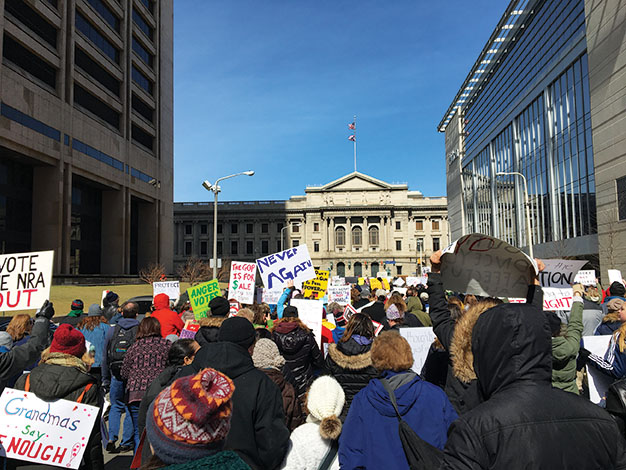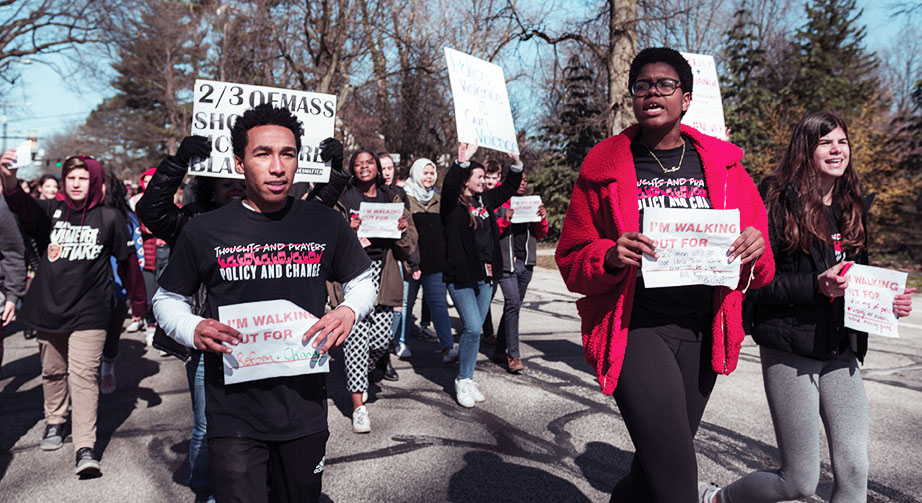Change, but at What Cost?
Generation Z is under pressure to change the world all the while short-changing their own health
May 24, 2018
Lazy, narcissistic and shallow. What do these three adjectives have in common?
They were words used to describe Generation Z by the media.
That was before a wave of student activism flooded the country in light of the Feb. 14 shooting of 17 students and staff at Marjory Stoneman Douglas High School in Parkland, Fla.
Students are being targeted by people with guns in their “safe” schools now more than ever before. There have been 224 school shootings in the United States since the 1999 Columbine shooting. Because of this, the post-millennial generation is concerned with safety.
On April 20, 1999, two high school students killed 13 students and injured 24, then later killed themselves at their high school in Columbine, Colo. This was the beginning of the terror of mass shootings for Generation Z — and of the apathy older generations would begin to feel as they became increasingly common.
On April 16, 2007, a Virginia Tech student killed 32 fellow students and injured 23 others, introducing the fear that college students, too, are not safe on campus. On Dec. 14, 2012, elementary school students would begin to feel afraid to leave their homes and go to school after the Sandy Hook Elementary School shooting, where 26 students and teachers were killed and two others injured.
Rather than waiting around for change, members of Generation Z are taking matters into their own hands, leading adults to rebrand them as “the generation that will change the world.”
What do students think of this label?
“We’re not the generation that will change the world. We are the generation that is changing the world,” junior Kevin LaMonica said.
Sophomore Louise Spadoni believes the label is accurate. “Isn’t every generation the generation that is going to change the world? Because we are growing up and we’re going to be the ones voting and the ones in charge,” she said.
Generation Z, also known as Gen Z, includes people born between 1995 and 2012. Because most were born after 9/11, they have been shaped by terrorism; surrounded by screens from a young age, they have been shaped by technology; advocating for equal rights, they have been shaped by breaking traditions. They are the first generation in which everyone can be proud, no matter their race or sexual orientation.
Through her Snapchat account, Spadoni suggested a few days after the Parkland shooting that Shaker students wear all black to school the following week to honor the 17 victims and bring attention to the issue of gun violence.
“I knew that Shaker would totally do a blackout, but I didn’t think [the news] would get out there like it did,” Spadoni said. “When I came to school, I was moved to tears. It was so powerful and amazing to see everyone coming together like that.”
Approximately 500 students walked out of the high school March 14 in 22-degree weather to participate in a 17 minutes of silence observed nationally to honor the Parkland victims. Students held posters stating the names and ages of the victims, and others held signs that stated, “Enough is Enough,” “Never Again,” and “More Love, Less Guns.”
The demonstration, organized and promoted by Shaker Students 4 Change, also aimed to protest insufficient gun control reforms and continue informing students about future walkouts and movements.
Senior Yasmine Kayali said that she thinks everyone is aware of high school students pushing for stricter gun reform. “I think there’s a lot more that Generation Z is focusing on, and there’s a lot more to it than people would know from reading the news or looking on Twitter,” she said.
Spadoni noted such an example. “I was just reading about a girl who was rallying for change in Flint, Mich. against the water. There are so many kids on social media our age creating change,” she said. Toxic levels of lead were discovered in the Flint water supply in 2014, and the water remains unsafe.
LaMonica spoke, marched and helped to organize the March For Our Lives at Public Square in Cleveland on March 24, where an estimated 20,000 people were in attendance. “In writing the speech, there [were] a few things that I wanted to touch upon. The first was the cycle of no change after tragedies, the specific policy initiatives that the march was advocating for and the influence of the gun lobby on our government,” LaMonica said.

He continued, “We see mass shooting after mass shooting, and elected officials give their thoughts and prayers, and then they wait for the conversation to die down. It’s important that this time is different, because this issue is a matter of life or death.”
The currency and accessibility of social media have altered the course by which ideas become activist movements.
“Technology helps these movements get started, and helps them spread to all different types of people across all different socioeconomic statuses and backgrounds,” sophomore Aaliyah Williams said.
LaMonica challenged a negative stereotype about Gen Z. “One of the names of our generation is ‘the iGeneration,’ but I think sometimes adults look at us and think, ‘Their faces are always in their phones; they don’t care about anything,’ ” he said.
However, Laura Lewis, a member of the gun-reform group Moms Demand Action, recognized the role of social media and said that activism must extend to the ballot box.
“I think students need to register to vote and pay attention to all the elections, including your local elections,” Lewis said. “Make your voices heard. You have such power.”
“[Moms Demand Action] was one single person who just started a Facebook page, which now has ignited this movement,” she added.
Though today’s student-led protests are highly publicized on social and mass media, previous generations also saw plenty of student-led protests.
Dr. Malia McAndrew, an associate professor at John Carroll University, researches gender and race in modern America. “If you look at the civil rights movement, many of the people who were on the front lines of that battle were pretty young,” she said. “When Martin Luther King Jr. was starting, he was in his early 20s. Many of the other people who led the sit-ins, the marches, the protests, they were all young, also.”
In 1960, four African-American students from North Carolina Agricultural and Technical State University sat at a whites-only lunch counter to protest segregation in Greensboro, N.C. This protest inspired others around the country to take action with silent protest.
“If you look at any of the major movements for social change in the 20th century, often young people were an important part in those movements,” McAndrew said.
“Every generation passes the baton on from one generation to the next, so Generation Z has to change the world because it is in a position of power,” McAndrew continued.
However, this rebranding of Gen Z as the hope of our country may create a burdensome, unattainable expectation.
According to Psychology Today, the average high school teenager has the same level of anxiety as the average psychiatric patient did in 1950. According to Time magazine, depression rates have skyrocketed by 37 percent among members of Generation Z due to the pressures of school, home, society and technology.
“I do feel like Generation Z has a lot of pressure on them because society is changing so much,” school psychologist Sagar Patel said. Added to the constant pressures of jobs and colleges, he said, Generation Z kids have the stresses of high expectations from older generations.
But these trends were noted even before the Parkland shooting, and before Gen Z was labeled a force to change the world.
Patel said that older generations may transfer their pressures to youth and mistakenly feel that their job is done. “If you’re living and breathing, you have a role to play,” he said.
Williams said that a lot of young people are anxious. “I know that most of us feel a lot of pressure from each other to make a better environment for ourselves because we know that other people aren’t going to do it for us,” she said.
African-American members of Gen Z are threatened and stressed by gun violence, and not just in school. Police shootings of unarmed African-American men dominate the news, leading to more stress about and fear of gun violence.
“I don’t live in a bad neighborhood. I live in the suburb of Shaker, which is a very calm and peaceful neighborhood,” senior Jalan Morgan said. “But, it does affect me directly because being black in America, you never know what’s going to happen, and you never know if you’re going to get pulled over because you forgot to turn on your turn signal, or you accidentally ran a stop sign, or the light turned red and you didn’t notice.”
The Black Lives Matter movement, created by young people after a Ferguson, Mo. police officer shot and killed Michael Brown, thrived through social media, where ideas of change are conveyed widely and motivate people to get involved. According to a study done by PSFK, an American company that focuses on consumer and corporate trends, 46 percent of Generation Z believe that they can contribute to changing the world.
Williams said, “Since we are the largest living generation, so many of us want to be activists and so many of us can’t deal with what’s happening around us. We all want to take action, and we will definitely be the generation to change things.”
Journalism II Reporters Katie Cronin, Hilary Shakelton and Olivia Warren contributed reporting. A version of this article appears in print on pages 50-53 of Volume 88, Issue III, published May 18, 2018.
